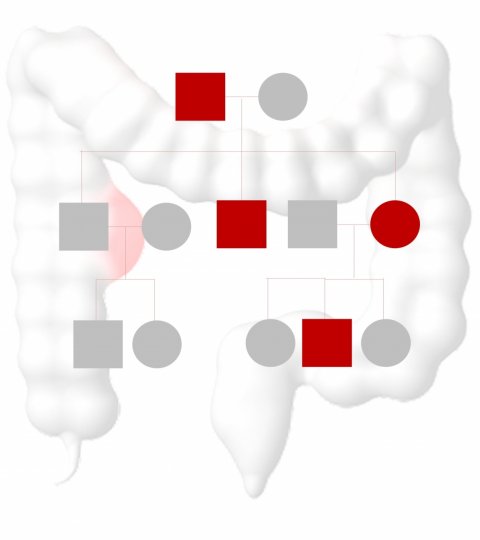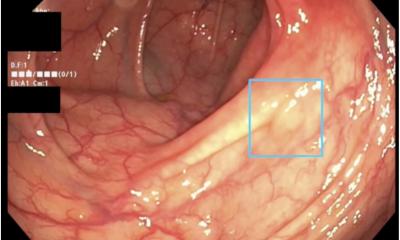News • MSI tumors
Vaccination against hereditary colorectal cancer shows promise
Scientists from the German Cancer Research Center and Heidelberg University Hospital have for the first time been able to delay the development of hereditary colorectal cancer with a protective vaccination.
Mice with a hereditary predisposition to colorectal cancer survived significantly longer after vaccination than unvaccinated animals. Combining the vaccination with an anti-inflammatory drug increased the protective effect. The researchers present their findings in the journal Gastroenterology.

© Kloor / DKFZ
In so-called microsatellite unstable (MSI) cancers, an important cellular repair system that normally corrects small DNA errors has failed. If such DNA defects remain uncorrected, the protein's entire blueprint can go out of sync. The cells then form novel protein structures, so-called neoantigens, which are often recognized as foreign by the immune system. MSI tumors can develop spontaneously or as a result of a hereditary predisposition, Lynch syndrome. About a quarter of MSI colon tumors are caused by Lynch syndrome. About half of those affected develop cancer during their lifetime.
A team led by Magnus von Knebel Doeberitz, who heads a research division based both at Heidelberg University Hospital and at the German Cancer Research Center, has been able to show in many years of preliminary work that many patients with Lynch syndrome share identical mutations and thus identical neoantigens in their tumors. "We therefore wanted to test whether such frequently occurring neoantigens are capable of activating the immune system against the tumor cells as a protective vaccine and thus preventing cancer from developing," says Matthias Kloor, who leads the research on preventive vaccinations in Lynch syndrome.
We were able to demonstrate for the first time in a living organism that vaccination with neoantigens protects against cancer
Matthias Kloor
A phase I/IIa clinical trial initiated by the Heidelberg researchers on the safety and immunological efficacy of such a vaccination has already been successfully completed at the Northwest Hospital in Frankfurt*. Whether this vaccination can actually prevent tumors and prolong patient survival, however, will only become clear in a few years. But the team led by von Knebel Doeberitz and Kloor has already achieved an important milestone on the road to cancer vaccination. With their current work, the researchers have shown for the first time in an animal model that protective vaccination with MSI-typical neoantigens can actually protect against cancer. For this purpose, the team studied a mouse strain that develops colorectal cancer as a result of a defect in DNA repair enzymes - comparable to humans suffering from Lynch syndrome. The "Lynch mice" develop tumors in the intestine from the age of six months and die a few weeks or months later.
In collaboration with Steven Lipkin from Weill Cornell Medical College in New York and colleagues from other U.S. research institutions, the Heidelberg team identified various protein structures in the Lynch mice that occur as a result of the DNA defects. A special algorithm predicted which of these neoantigens could trigger a strong immune response in mice. Four vaccine peptides were eventually selected for the experiments. The vaccinated mice survived an average of 351 days, whereas unvaccinated animals survived only 263 days. The tumor mass was also significantly lower in the vaccinated animals. If the mice received the drug naproxen in addition to the vaccine, this further increased the preventive effect of the vaccination. Naproxen is an anti-inflammatory and painkiller that, like aspirin, belongs to the group of non-steroidal anti-inflammatory drugs (NSAIDs). Agents from this group are already recommended for chemoprevention of colorectal cancer in patients with Lynch syndrome in some countries. "Even in unvaccinated Lynch mice, we have seen that the immune system is active against the four neoantigens," explains Magnus von Knebel Doeberitz. "So our vaccination enhances an already existing natural immune response against the cancer cells."
"We were able to demonstrate for the first time in a living organism that vaccination with neoantigens protects against cancer," emphasizes Matthias Kloor, adding, "What is particularly promising is that immune protection and prevention with an anti-inflammatory seem to complement each other in their effect. The results show that vaccination against hereditary cancers is a promising concept that we now want to transfer further into clinical application."
Source: German Cancer Research Center
26.07.2021





